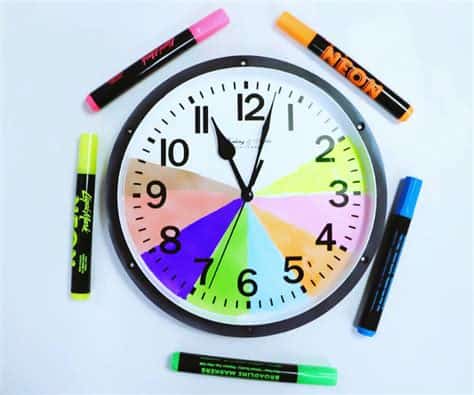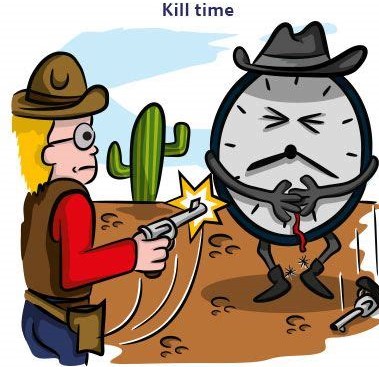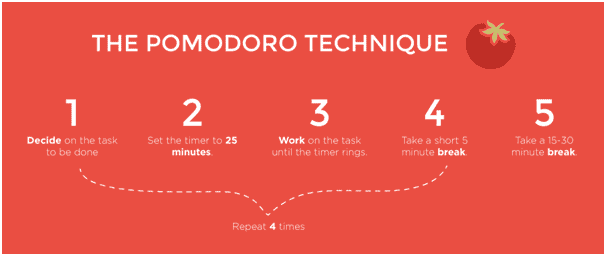The IAS score reflects your preparation and hard work over months which finally judged during a three-hour test.
In all examinations, time is of the essence. Literally.
You must have experienced the feeling of the examiner approaching at great speed, coming to snatch your answer sheet away, while you desperately try to move your tired hands as fast as possible across the pages and scribble away feverishly.

On exam-day, the only thing that matters is how well you perform in the three hours of the day scheduled for taking the IAS exam.
The number of questions can vary from 2 in the Essay paper to 20, in General Studies papers. But in all papers of the UPSC mains exam, you will be writing about 2000 words over a three hour period.
While most advice you find is about time management, I think you must go one step beyond this. Just ‘Managing’ time isn’t enough in the IAS exam because you are not merely trying to survive the exam, you are trying to ace it and maximize your IAS score.
Therefore, it is critical to have control over the time during those crucial three hours.
But why ‘manage’ time when you can master it?
In this chapter, you will learn how to master time in the examination WITHOUT even needing to look at your watch.
Why master time?
Mastering time is important because of some less obvious reasons-

- Anxiety-performance cycle – If you are running out of time, you will feel anxious, which will reduce your performance during the IAS exam. Moreover, trying to catch up with time has an added disadvantage i;e the quality of your answers will drop along with your IAS score.
- Revisions are extremely important in a competitive examination, but it is a luxury which is rarely afforded. Usually the final moments of the exam are spent trying to attempt all the questions in question paper with no scope for a round of revision which can also drag your IAS score.
- Error-rate: If there is ample time on hand in the IAS exam, it becomes much easier to maintain quality control while writing. This basically means that you will make fewer mistakes and score higher marks.
What are the tasks which demand your time?
The first step is to figure out all the different things which require your time during the IAS exam.

- Deciding and Choosing: You may have to choose which questions to attempt and which ones to avoid. This is an important step and deciding well is critical for success. You need a few minutes to calmly and logically make good choices in the exam.You can read about the cheat code for making good choices here.
- Intelligent rough work: The quality of your answers depends on the quality of your thinking before you begin writing. You first Imagine your answer in your head before committing it to paper. This is called pre-writing or Rough work. The clearer you are in your rough work, the better your answer will be so you must set aside dedicated time for this task.
- Writing and transcribing: Then comes the time to write your answers in an organised manner. Writing will consume the bulk of your time in a paper-and-pen test.
- Revisions are essential for error-correction and quality-control and usually take more time than expected as there are always improvements to be made in the answers.
But these are just the basic tasks which are obvious. To master time, you need to know about time-bombs.
Time-bombs
Time-bombs are unpredictable events which can kill your time during the IAS exam.

- Document verification, signing and other formalities: In the middle of the exam, the invigilator will come around and interrupt you.
- Freak accidents and disturbances where your chair breaks or you need a pencil. Maybe there is misprint or error in the question paper and you must wait for clarification. Or if someone gets caught cheating around you, and the commotion makes it impossible to concentrate. While these events are rare, you should nevertheless do your best to be prepared for the worst.
- Toilet breaks
- Fatigue: Physical fatigue is always ignored and always wastes time in the examination. In a paper and pen test where you must write long answers and essays, your hands will get surely get tired and hurt, forcing you to slow down.

All these time-bombs can add up to 15 minutes which is a LOT of time to waste during the IAS exam.
What to do?
Anticipating and factoring these time bombs in your exam strategy is what sets time mastery apart from time management.
You know from the previous article about essay writing that the most important things in the Essay and answers are -logic, organization, consciences, structure and flow.
If you haven’t read it, you can find it here.
As you know, it is important to have all your points with you before you start writing.
But it is equally important to allocate time to tasks based on their importance.
So you must divide your time in a way that you achieve all the above.

In the answer, everything you do later, will flow from your rough work so it is of utmost importance and therefore you should allocate some time to it.
Important: Now you may notice that you will have spent some time of the exam doing rough work and without having written a single word in your answer sheet.
At this point in the exam, If you were to look around, you would see people writing feverishly. It may also seem like you are the only person not writing in the examination hall.
But don’t worry because if you do this scientifically, then when the IAS score comes, you will be far ahead of most people who were writing feverishly.
While writing, if you are not mindful about time, you can easily end up writing too much on something trivial and too little on something which is very important.
You may even overshoot the word limit, for which you will lose marks.
Allocate 10 minutes for Revisions.

10 minutes for revisions is not a lot of time considering that you will be reading About TWO THOUSAND words which you have just written and need to make corrections on them.
Allocate 10 minutes for Time bombs.
It is a good strategy to allocate time for unpredictable events because even if nothing happens you will have a buffer of 10 minutes to calmly finish your essays and maybe polish them off with some underlining.
But how will you keep track of all these time-slices in the IAS exam?
All of this sounds good, but it is easier said than done. You can use this cheat code to boost your IAS score.
IAS SCORE CHEAT CODE
Get Time mastery superpowers FAST!
You have a secret weapon which you need to use- Your brain’s inherent sense of time.
Has it ever happened to you that you set the alarm to wake you up at some time and you automatically get up just a minute Before the alarm goes off?
Or even when You fell asleep while travelling in a train or a bus and woke up automatically, just when your stop was coming up?

Your brain has an in-built clock to keep track of time. A very accurate one.
The key is to do timed practice so that your sense of time becomes so automatic that you don’t make any mistakes in the IAS exam.
I recommend using the Pomodoro technique. The word may sound fancy, but Pomodoro is just Spanish for ‘Tomato‘.
The Pomodoro technique is a method of time management in which you focus for about 20 to 25 minutes on ONE task in front of you, WITHOUT distractions.

After the 25 minutes, you could take a five-minute break.
Then work again for 25 minutes and repeat this cycle as many times as you can.
These 25-minute blocks are deliberate. It is the Scientifically researched amount of time of deep work which humans should work, for maximum concentration.
Conclusion
TO give you a sense of how useful this is, remember how you must write for 100 minutes in the IAS exam? This happens to be exactly four such 25-minute sessions.

And ALL your three-hour examinations are made up of approximately seven chunks of 25-minute each.
Once you Practice with this technique enough times, your brain will develop a sense of what 25 minutes feels like.
Soon you won’t need to look at the clock at all and your brain will automatically know how the time is passing.
With a bit of timed practice using this method, no time-bombs will affect you in the IAS exam.
Good times!

1.T1:human being T2:humane
2.T1: catalyst T2:tranquil self
3.T1: around T2:inside
4.T1: simplicity T2: sophistication
5.T1: culture T2: civilization
6.T1: social justice T2: economic prosperity
7.T1:patriarchy T2: social inequality
8.T1: technology T2: international relations
T1:human being T2:humane
T1: catalyst T2:tranquil self
T1: around T2:inside
T1: simplicity T2: sophistication
T1: culture T2: civilization
T1: social justice T2: economic prosperity
T1:patriarchy T2: social inequality
T1: technology T2: international relations
Very good article! We are linking to this particularly great content on our site. Keep up the great writing.
Hi there, after reading this amazing paragraph i am as well delighted to share my knowledge here with friends.
Thanks so much for the blog post.
I really like and appreciate your blog post.
Like!! Great article post.Really thank you! Really Cool.
1.Thing1:string operation
1.spying
2. Secretively
3. Journalism
4. Truth
5. Public
6. Awareness
7. Crime
8. Police
9. Knowledge
10. Mentally prepared
11. Aim
12.goal
13. Publicity
14. News
15. To save country
Thing2: privacy
1. Secret
2. Apps
3. Banks
4. Life
5.leading
6.money
7.earning
8.knowledge
9.demand
10. Supply
11.availabilty
12.requirement
13.need
14. Services
15.provided
2. Thing1:human being
1.food
2. Shelter
3.needs
4. Creativity
5. Necessity
6.knowledge
7.new invention
8. Work
9.early man
10. Mammals
11.cloths
12. Earnings
13. Thinking
14.helping
15.rich and poor
Thing2:humane
1.kindness
2. Understanding
3. Suffering
4.animals
5.person
6.good
7.personality
8.behavior
9.stereo types
10.poor
11. Rich
12. Spirituality
13. Believing
14. People
15. Thinking
3.thing1: power
1.energy
2. Workout
3. Food habits
4.leaders
5.public
6. Ruling
7. Control
8.things
9.country
10. Work
11. Earnings
12. Food
13 . Shelter
14. Necessity
15. Provide
Thing 2: responsibility
1:duty
2.fault
3.work
4. Proper way
5. Leader
6. Authority
7. Power
8.helping
9. Providing
10.refuse
11.admitted
12. Blame
13. Keep going
14. Emotional
15.conditions